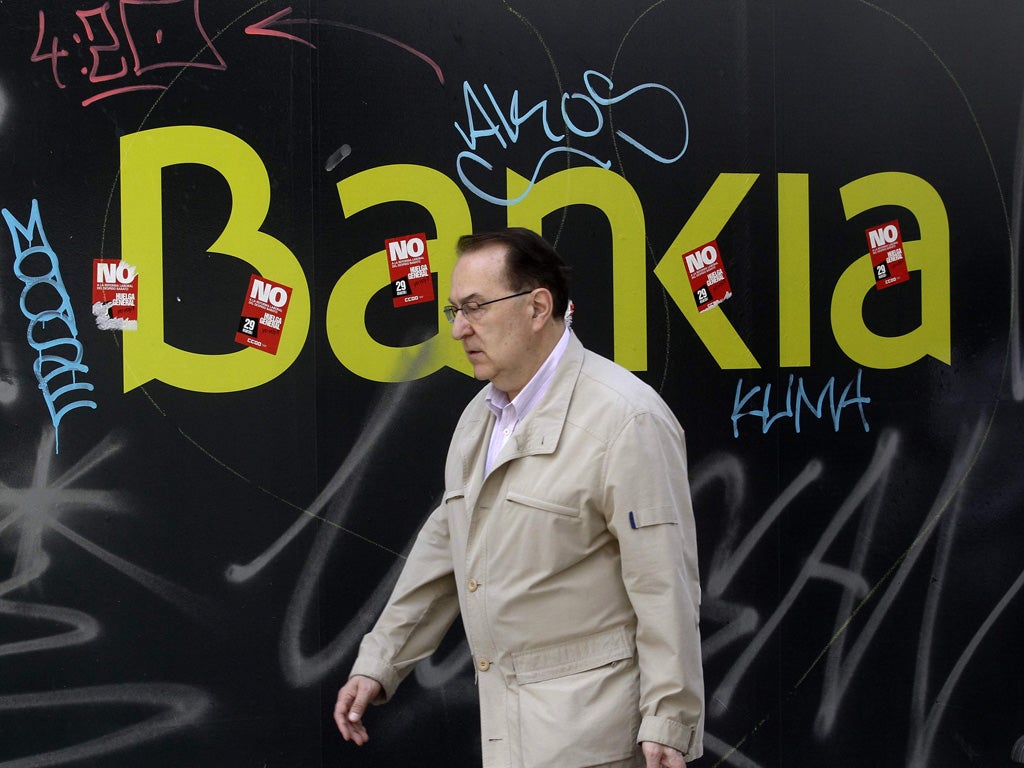Spain's debt costs break 7% level

Your support helps us to tell the story
From reproductive rights to climate change to Big Tech, The Independent is on the ground when the story is developing. Whether it's investigating the financials of Elon Musk's pro-Trump PAC or producing our latest documentary, 'The A Word', which shines a light on the American women fighting for reproductive rights, we know how important it is to parse out the facts from the messaging.
At such a critical moment in US history, we need reporters on the ground. Your donation allows us to keep sending journalists to speak to both sides of the story.
The Independent is trusted by Americans across the entire political spectrum. And unlike many other quality news outlets, we choose not to lock Americans out of our reporting and analysis with paywalls. We believe quality journalism should be available to everyone, paid for by those who can afford it.
Your support makes all the difference.Spain's ability to manage its debt without an international bailout was thrown into doubt Monday after investors pushed its borrowing rates up to the level at which Greece, Portugal and Ireland had sought help.
Investor sentiment improved briefly in the morning as electoral results in Greece suggested the country would not drop out of the euro currency union, a scenario that would have put severe stress on Spain's markets.
But that market relief quickly faded in Madrid as it became clear that Spain's fundamental economic and fiscal problems remain huge.
The interest rate on Spain's 10-year bonds — an indicator of market confidence in how well a country can pay down its debt —hit a fresh eurozone era high of 7.18 percent, and stocks fell 2.6 percent in Madrid.
The bond yield's alarming 0.31 percentage-point rise put it firmly in the 7 percent range that prompted the other three eurozone countries ask for a bailout.
The yield indicates at what rate a government can raise money from financial markets. So while Spain would be able to afford such a high rate in the short term — for a few bond auctions — it would find the rate too expensive in the longer term. If the rate does not fall back down, Spain may have to ask for foreign aid to finance itself.
Spain has already requested a bailout for its banking sector, which is saddled with billions of euros in soured investments after the implosion of a real estate bubble. The country is expected to announce by Wednesday how much it will tap from a €100 billion eurozone fund after two independent auditors complete evaluations of the banks' needs.
But because the government is ultimately responsible for repaying the banks' bailout money, the deal has increased fears about the size of public debt. If the government cannot get the bailout money back from the banks, it will be saddled with the losses.
Those losses could prove too much to handle for the government, which is already struggling with a second recession in three years and the highest unemployment rate among the 17 nations that use the euro.
Financing the Spanish government, however, would likely be too expensive for the eurozone bailout funds to handle. Spain's €1.1 trillion economy is bigger than those of Greece, Ireland and Portugal combined.
"Lending money is all about confidence, and that is shot to bits right now," said Gary Jenkins, managing director of the Swordfish Research Ltd.
Some analysts said the pressure on Spanish bonds may have been exaggerated, but reflected growing concerns that the eurozone still seems unable to contain the financial crisis that has roiled it for years.
"It is simply the result of the market reflecting once again the notion that a comprehensive solution regarding containing the financial crisis in Europe hasn't come forward yet and that still much work has to be done in order for investors' confidence to return," said Ishaq Siddiqi, market strategist with ETX Capital.
Spain has said repeatedly it cannot sustain such high interest levels for its bonds much longer. Finance Minister Cristobal Montoro issued an urgent plea Monday for the European Central Bank to buy its bonds and force the rate down. The ECB did that last year but then stopped, as it is against its rules to directly help governments. Its primary function is to control eurozone interest rates.
It is impossible to predict whether investors will continue to demand such high rates to lend to Spain and push the country to take a bailout, said Hans Martens, chief executive of the Brussels-based European Policy Center.
"I think if it happened, it would be completely illogical because I think there's a lot more growth potential in Spain. The economy is bigger, they are more competitive, so I hope they will be given the time to grow out of it," he said.
Meanwhile, Spain's central bank announced Monday that bad debts held by the country's banks rose to a new 18-year high in April, indicating more companies and individuals are failing to make payments on time. The amount stood at €152.7 billion, or 8.72 percent of the loans held by Spanish banks. The rate was 8.37 percent in March.
AP
Join our commenting forum
Join thought-provoking conversations, follow other Independent readers and see their replies
Comments